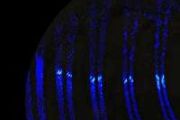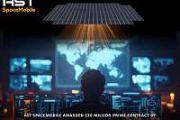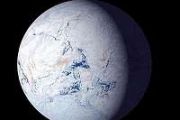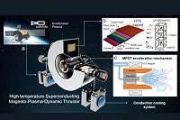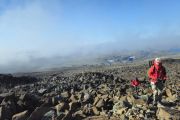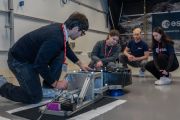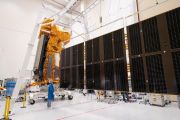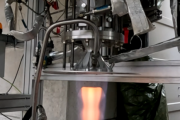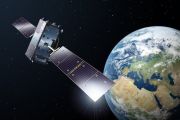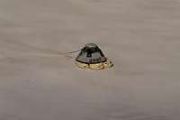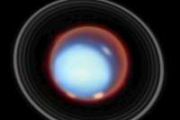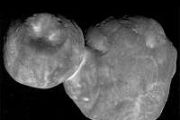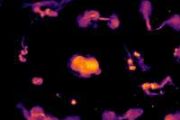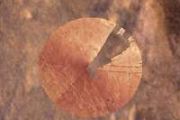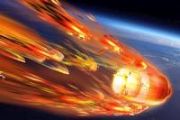
Copernical Team
New MeerKAT radio image reveals complex heart of the Milky Way
 The South African Radio Astronomy Observatory (SARAO) has released a new MeerKAT telescope image of the centre of our Galaxy, showing radio emission from the region with unprecedented clarity and depth. The international team behind the work is publishing the initial science highlights from this image in The Astrophysical Journal. The article is accompanied by a public release of the data to the
The South African Radio Astronomy Observatory (SARAO) has released a new MeerKAT telescope image of the centre of our Galaxy, showing radio emission from the region with unprecedented clarity and depth. The international team behind the work is publishing the initial science highlights from this image in The Astrophysical Journal. The article is accompanied by a public release of the data to the Nearly 1,000 mysterious strands revealed in Milky Way's center
 An unprecedented new telescope image of the Milky Way galaxy's turbulent center has revealed nearly 1,000 mysterious strands, inexplicably dangling in space.
Stretching up to 150 light years long, the one-dimensional strands (or filaments) are found in pairs and clusters, often stacked equally spaced, side by side like strings on a harp. Using observations at radio wavelengths, Northwester
An unprecedented new telescope image of the Milky Way galaxy's turbulent center has revealed nearly 1,000 mysterious strands, inexplicably dangling in space.
Stretching up to 150 light years long, the one-dimensional strands (or filaments) are found in pairs and clusters, often stacked equally spaced, side by side like strings on a harp. Using observations at radio wavelengths, Northwester Studying the Big Bang with Artificial Intelligence
 Can machine learning be used to uncover the secrets of the quark-gluon plasma? Yes - but only with sophisticated new methods.
It could hardly be more complicated: tiny particles whir around wildly with extremely high energy, countless interactions occur in the tangled mess of quantum particles, and this results in a state of matter known as "quark-gluon plasma". Immediately after the Big B
Can machine learning be used to uncover the secrets of the quark-gluon plasma? Yes - but only with sophisticated new methods.
It could hardly be more complicated: tiny particles whir around wildly with extremely high energy, countless interactions occur in the tangled mess of quantum particles, and this results in a state of matter known as "quark-gluon plasma". Immediately after the Big B A VIPER in the Sand
 The test version of NASA's Volatiles Investigating Polar Exploration Rover, or VIPER, kicks up high sinkage sand-like material while transiting NASA Glenn's Simulated Lunar Operations Laboratory, or SLOPE bed. In November 2021, the latest test rover visited SLOPE to complete the next iteration of mobility testing, a critical step toward ensuring the rover is ready for its 2023 mission to the Moo
The test version of NASA's Volatiles Investigating Polar Exploration Rover, or VIPER, kicks up high sinkage sand-like material while transiting NASA Glenn's Simulated Lunar Operations Laboratory, or SLOPE bed. In November 2021, the latest test rover visited SLOPE to complete the next iteration of mobility testing, a critical step toward ensuring the rover is ready for its 2023 mission to the Moo Making matter from collisions of light
 Nuclear scientists have used a powerful particle accelerator to create matter directly from collisions of light. Scientists predicted this process in the 1930s, but it has never been achieved in a single direct step.
The researchers accelerated two beams of gold ions to close to the speed of light in opposite directions. At such speeds, each gold ion is surrounded by particles of light (re
Nuclear scientists have used a powerful particle accelerator to create matter directly from collisions of light. Scientists predicted this process in the 1930s, but it has never been achieved in a single direct step.
The researchers accelerated two beams of gold ions to close to the speed of light in opposite directions. At such speeds, each gold ion is surrounded by particles of light (re Advances in Space Transportation Systems Transforming Space Coast
 From a seaside perch overlooking the hustle and bustle of ships coming and going at Port Canaveral on Florida's east coast, Dale Ketcham reflects on decades of history with nostalgia.
"I moved here and learned how to walk on Cocoa Beach three years before NASA was created" in 1958, he said.
Not only can Ketcham trace his life alongside the U.S. space program, he's had a firsthand vie
From a seaside perch overlooking the hustle and bustle of ships coming and going at Port Canaveral on Florida's east coast, Dale Ketcham reflects on decades of history with nostalgia.
"I moved here and learned how to walk on Cocoa Beach three years before NASA was created" in 1958, he said.
Not only can Ketcham trace his life alongside the U.S. space program, he's had a firsthand vie 12 Companies to Provide Venture Class Launch Services for NASA
 NASA has selected 12 companies to provide launch services for the agency's Venture-Class Acquisition of Dedicated and Rideshare (VADR) missions, providing new opportunities for science and technology payloads and fostering a growing U.S. commercial launch market.
The fixed-price indefinite-delivery/indefinite-quantity contracts have a five-year ordering period with a maximum total value of
NASA has selected 12 companies to provide launch services for the agency's Venture-Class Acquisition of Dedicated and Rideshare (VADR) missions, providing new opportunities for science and technology payloads and fostering a growing U.S. commercial launch market.
The fixed-price indefinite-delivery/indefinite-quantity contracts have a five-year ordering period with a maximum total value of Enabling artificial intelligence on satellites
 Swarms of hundreds or thousands of small satellites are increasingly used for bringing data and internet services to Earth. To position, communicate and dispose such large amounts of satellites, Artificial Intelligence is getting increasingly important.
To enable a large-scale use of Artificial Intelligence in orbit, RUAG Space, Europe's leading supplier to the space industry, and Stream A
Swarms of hundreds or thousands of small satellites are increasingly used for bringing data and internet services to Earth. To position, communicate and dispose such large amounts of satellites, Artificial Intelligence is getting increasingly important.
To enable a large-scale use of Artificial Intelligence in orbit, RUAG Space, Europe's leading supplier to the space industry, and Stream A Summit to ignite Europe's bold space ambitions
 European leaders will reaffirm plans to launch Europe on a world-leading trajectory during a high-level space summit to be held on 16 February in Toulouse, France.
Urgent action is needed to tackle the unprecedented societal, economic and security challenges faced by Europe - from the climate crisis and its consequences to threats to crucial infrastructure in space and on Earth.
Spac
European leaders will reaffirm plans to launch Europe on a world-leading trajectory during a high-level space summit to be held on 16 February in Toulouse, France.
Urgent action is needed to tackle the unprecedented societal, economic and security challenges faced by Europe - from the climate crisis and its consequences to threats to crucial infrastructure in space and on Earth.
Spac Satellogic completes transaction to become publicly traded company
 Satellogic Inc., a leader in sub-meter resolution satellite imagery collection has completed its previously announced business combination with CF Acquisition Corp. V (Nasdaq: CFV) ("CFV"), a publicly traded special purpose acquisition company sponsored by Cantor Fitzgerald. The business combination was approved at a special meeting of CFV stockholders on January 24, 2022. Beginning Wednesday, J
Satellogic Inc., a leader in sub-meter resolution satellite imagery collection has completed its previously announced business combination with CF Acquisition Corp. V (Nasdaq: CFV) ("CFV"), a publicly traded special purpose acquisition company sponsored by Cantor Fitzgerald. The business combination was approved at a special meeting of CFV stockholders on January 24, 2022. Beginning Wednesday, J 









